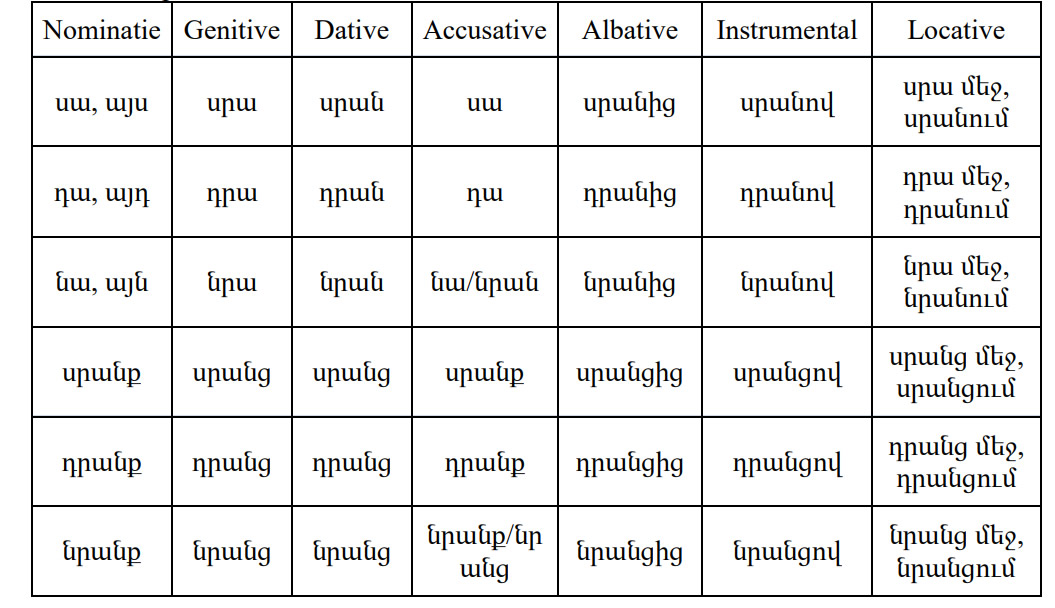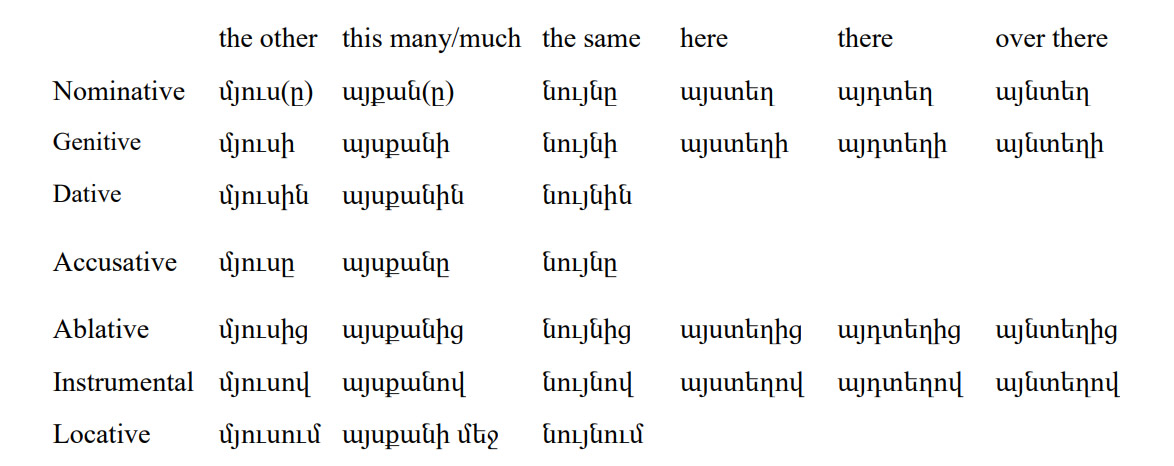Difference between revisions of "Language/Armenian/Grammar/Demonstrative-pronouns"
m (Quick edit) |
m (Quick edit) |
||
| Line 2: | Line 2: | ||
[[File:Armenian-Language-Polyglotclub.png|thumb]] | [[File:Armenian-Language-Polyglotclub.png|thumb]] | ||
Hi/բարև Armenian Learners! 😃 | Hi/բարև Armenian Learners! 😃 | ||
➡ In today's lesson we will learn How to use the demonstrative pronouns in Armenian. | ➡ In today's lesson we will learn How to use the demonstrative pronouns in Armenian. | ||
Happy learning! | Happy learning! | ||
<span link>With the completion of this lesson, consider investigating these related pages:</span> [[Language/Armenian/Grammar/The-Genitive-Case|The Genitive Case]], [[Language/Armenian/Grammar/Cases-of-Nouns|Cases of Nouns]], [[Language/Armenian/Grammar/Pronouns|Pronouns]] & [[Language/Armenian/Grammar/Conditional-Mood-Past-Conditional|Conditional Mood Past Conditional]]. | |||
__TOC__ | __TOC__ | ||
Demonstrative pronouns are used to indicate a specific noun and precede the noun they refer to. | Demonstrative pronouns are used to indicate a specific noun and precede the noun they refer to. | ||
As with personal pronouns, demonstrative pronouns also change according to their case. | As with personal pronouns, demonstrative pronouns also change according to their case. | ||
==Declension of the demonstrative pronouns== | ==Declension of the demonstrative pronouns== | ||
The table below illustrates the declension of the demonstrative pronouns. | The table below illustrates the declension of the demonstrative pronouns. | ||
[[File:Armenian-Language- Demonstrative Pronouns PolyglotClub.jpg]] | [[File:Armenian-Language- Demonstrative Pronouns PolyglotClub.jpg]] | ||
# Սրանք մեր ամենահին եկեղեցիներն են: These are our oldest churches. | # Սրանք մեր ամենահին եկեղեցիներն են: These are our oldest churches. | ||
| Line 34: | Line 26: | ||
# Մենք շատ ենք հպարտանում սրանցով: We are very proud of these. | # Մենք շատ ենք հպարտանում սրանցով: We are very proud of these. | ||
# Սրանցում սուրբ հոգի կա։ There is holy spirit in these. | # Սրանցում սուրբ հոգի կա։ There is holy spirit in these. | ||
==Classifed as definite pronouns in English but as Demonstrative in Armenian== | ==Classifed as definite pronouns in English but as Demonstrative in Armenian== | ||
| Line 41: | Line 32: | ||
[[File:Armenian-Language- Demonstrative Pronouns 2 PolyglotClub.jpg]] | [[File:Armenian-Language- Demonstrative Pronouns 2 PolyglotClub.jpg]] | ||
Pay attention to the usage of the մյուսը in different cases. | Pay attention to the usage of the մյուսը in different cases. | ||
| Line 52: | Line 41: | ||
#Ես այդ գրիչով չեմ գրել։ Ես գրել եմ մյուսով։ I have not written with this pen. I have written with the other one. | #Ես այդ գրիչով չեմ գրել։ Ես գրել եմ մյուսով։ I have not written with this pen. I have written with the other one. | ||
#Այս պահարանում ոչինչ չկա։ Բոլոր շորերը մյուսում են։ There is nothing in this shelf. All clothes are in the other one. | #Այս պահարանում ոչինչ չկա։ Բոլոր շորերը մյուսում են։ There is nothing in this shelf. All clothes are in the other one. | ||
Notice that այստեղ, այդտեղ and այնտեղ do not have dative, accusative and locative forms. Here are sentences that use the dative and accusative այս տեղ - “this place.” | Notice that այստեղ, այդտեղ and այնտեղ do not have dative, accusative and locative forms. Here are sentences that use the dative and accusative այս տեղ - “this place.” | ||
| Line 58: | Line 46: | ||
# Ես անիծում եմ այս տեղը։ I curse this place. | # Ես անիծում եմ այս տեղը։ I curse this place. | ||
# Նա կապված է այդ տեղին։ She is attached to that place. | # Նա կապված է այդ տեղին։ She is attached to that place. | ||
For obvious semantic reasons “այս տեղ” - “this place” and “այստեղ” - “here”, as well as “այդ տեղ” - “that place” and “այդտեղ” - “there” , as well as “այն տեղ” - “the other place” and “այնտեղ” - “over there” are not interchangeable. | For obvious semantic reasons “այս տեղ” - “this place” and “այստեղ” - “here”, as well as “այդ տեղ” - “that place” and “այդտեղ” - “there” , as well as “այն տեղ” - “the other place” and “այնտեղ” - “over there” are not interchangeable. | ||
==Sources== | ==Sources== | ||
https://slaviccenters.duke.edu/sites/slaviccenters.duke.edu/files/handbook_of_armenian.pdf | https://slaviccenters.duke.edu/sites/slaviccenters.duke.edu/files/handbook_of_armenian.pdf | ||
== | ==Other Lessons== | ||
* [[Language/Armenian/Grammar/Time|Time]] | * [[Language/Armenian/Grammar/Time|Time]] | ||
* [[Language/Armenian/Grammar/Causative-Verbs|Causative Verbs]] | * [[Language/Armenian/Grammar/Causative-Verbs|Causative Verbs]] | ||
| Line 78: | Line 63: | ||
* [[Language/Armenian/Grammar/The-Present-Simple|The Present Simple]] | * [[Language/Armenian/Grammar/The-Present-Simple|The Present Simple]] | ||
* [[Language/Armenian/Grammar/Pronouns|Pronouns]] | * [[Language/Armenian/Grammar/Pronouns|Pronouns]] | ||
<span links></span> | |||
Latest revision as of 13:12, 27 March 2023
Hi/բարև Armenian Learners! 😃
➡ In today's lesson we will learn How to use the demonstrative pronouns in Armenian.
Happy learning!
With the completion of this lesson, consider investigating these related pages: The Genitive Case, Cases of Nouns, Pronouns & Conditional Mood Past Conditional.
Demonstrative pronouns are used to indicate a specific noun and precede the noun they refer to.
As with personal pronouns, demonstrative pronouns also change according to their case.
Declension of the demonstrative pronouns[edit | edit source]
The table below illustrates the declension of the demonstrative pronouns.
- Սրանք մեր ամենահին եկեղեցիներն են: These are our oldest churches.
- Սրա անունը Տաթև է, իսկ դրանըª Հաղպատ: This one’s name is Tatev, and that one is Haghpat.
- Նայիր սրան։ Սա հին գիրք է։
- Պատռի՛ր սա։ Tear this.
- Սրանից գեղեցիկ եկեղեցի չկա ամբողջ աշխարhում: There isn’t a more beautiful church in the whole world.
- Մենք շատ ենք հպարտանում սրանցով: We are very proud of these.
- Սրանցում սուրբ հոգի կա։ There is holy spirit in these.
Classifed as definite pronouns in English but as Demonstrative in Armenian[edit | edit source]
There are a group of pronouns, which in English are classified as definite pronouns, but in Armenian are classified as demonstrative.
Pay attention to the usage of the մյուսը in different cases.
- Մյուսն ավելի մեծ է։ The other one is larger.
- Սա մյուսի տուփն է։ This is the other one’s box.
- Այդ գիրքը մոտեցրու մյուսին։ Bring that book near the other one.
- Այդ մեկն իմը չէ, վերցրու՛ մյուսը։ That one is not mine, take the other one.
- Այս պահարանում, մյուսից երկու անգամ շատ գինի կա։ In this shelf there is twice as much wine as in the other one.
- Ես այդ գրիչով չեմ գրել։ Ես գրել եմ մյուսով։ I have not written with this pen. I have written with the other one.
- Այս պահարանում ոչինչ չկա։ Բոլոր շորերը մյուսում են։ There is nothing in this shelf. All clothes are in the other one.
Notice that այստեղ, այդտեղ and այնտեղ do not have dative, accusative and locative forms. Here are sentences that use the dative and accusative այս տեղ - “this place.”
- Ես անիծում եմ այս տեղը։ I curse this place.
- Նա կապված է այդ տեղին։ She is attached to that place.
For obvious semantic reasons “այս տեղ” - “this place” and “այստեղ” - “here”, as well as “այդ տեղ” - “that place” and “այդտեղ” - “there” , as well as “այն տեղ” - “the other place” and “այնտեղ” - “over there” are not interchangeable.
Sources[edit | edit source]
https://slaviccenters.duke.edu/sites/slaviccenters.duke.edu/files/handbook_of_armenian.pdf
Other Lessons[edit | edit source]
- Time
- Causative Verbs
- This, That and the Other One
- The Nominative Case
- There Is and There Are
- Definite Pronouns
- Conjunctions
- Obligatory Mood Past Obligatory
- The Present Simple
- Pronouns


